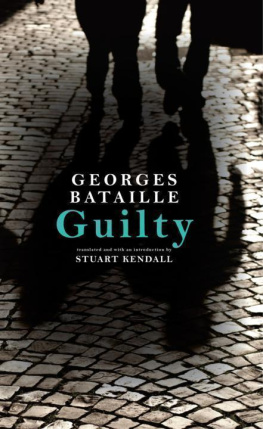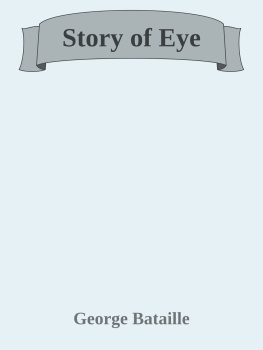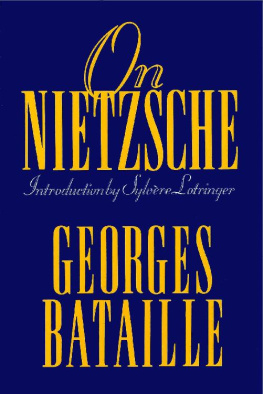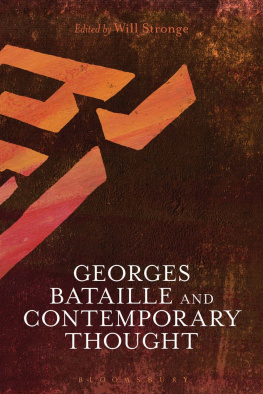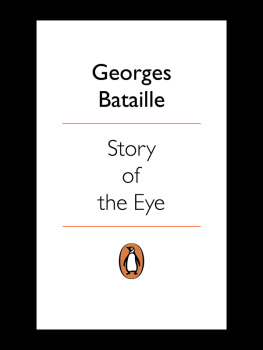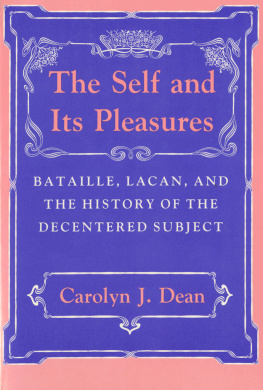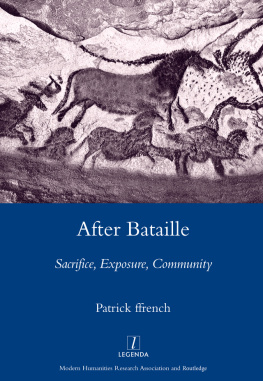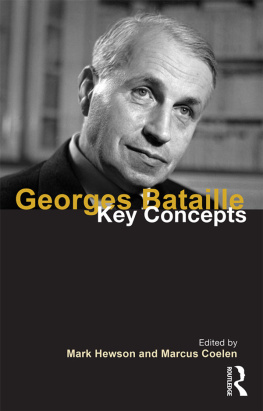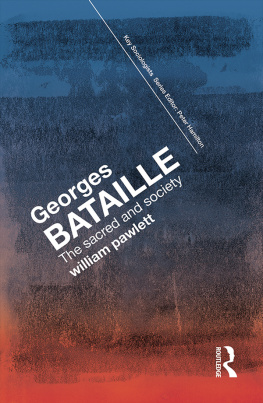
PENGUIN BOOKS
Contents
PENGUIN MODERN CLASSICS
LITERATURE AND EVIL
Georges Bataille, French essayist and novelist, was born in 1897. He converted to Catholicism, then to Marxism, and was interested in psychoanalysis and mysticism. As curator of the municipal library in Orleans, he led a relatively simple life, although he became involved, usually on the fringes, with the surrealist movement. He founded the literary review Critique in 1946, which he edited until his death in 1962, and was also a founder of the review Documents, which published many of the leading surrealist writers. His writing is a mixture of poetry and philosophy, fantasy and history, and his first novel, Story of the Eye, was published under the pseudonym of Lord Auch. Batailles other works include the novels Blue of Noon, LAbb C and My Mother, and the volume of essays Eroticism.
Preface
I belong to a turbulent generation, born to literary life in the tumult of surrealism. In the years after the Great War there was a feeling which was about to overflow. Literature was stifling within its limitations and seemed pregnant with revolution.
These studies, which are so strikingly coherent, were written by a mature man. Yet they were generated in the turbulence of his youth, and they faintly echo this.
I find it significant that a part of the first version of these essays should have appeared in Critique, a review which owed its success to its serious character. But I must add that, if I occasionally had to rewrite them, it is because, at first, I could provide no more than an obscure expression of my ideas owing to the turmoil in my mind. Turmoil is fundamental to my entire study; it is the very essence of my book. But the time has come to strive towards a clarity of consciousness. I say the time has come But there are moments when time almost seems to be lacking, or at any rate pressing.
These studies are the result of my attempts to extract the essence of literature. Literature is either the essential or nothing. I believe that the Evil an acute form of Evil which it expresses, has a sovereign value for us. But this concept does not exclude morality: on the contrary, it demands a hypermorality.
Literature is communication. Communication requires loyalty. A rigorous morality results from complicity in the knowledge of Evil, which is the basis of intense communication.
Literature is not innocent. It is guilty and should admit itself so.
Emily Bront
Emily Bront, of all women, seems to have been the object of a privileged curse. Her short life was only moderately unhappy. Yet, keeping her moral purity intact, she had a profound experience of the abyss of Evil. Though few people could have been more severe, more courageous or more proper, she fathomed the very depths of Evil.
This was the task of literature, imagination and dream. Her life, over by the time she was thirty, was completely sheltered. She was born in 1818 and rarely left the Yorkshire vicarage set in a rugged wasteland where her father, an Irish pastor, gave her an austere education, but little else. Her mother died early and her two sisters were extremely strict. A dissipated brother ruined himself somewhat romantically. We know that in the austerity of the vicarage, the three Bront sisters lived in a frenzy of literary creativity. They were bound together by a day-to-day intimacy, though Emily nevertheless continued to preserve that moral solitude in which the phantoms of her imagination developed. Reserved as she was, she appears to have been good, active and devoted, indeed gentleness itself. She lived in a sort of silence which, it seemed, only literature could disrupt. The morning she died, after a brief lung disease, she got up at the usual time, joined her family without uttering a word and expired before midday, without even going back to bed. She had not wanted to see a doctor.
She left behind her a short collection of poems and one of the greatest books ever written. Wuthering Heights is surely the most beautiful and most profoundly violent love story. For though Emily Bront, despite her beauty, appears to have had no experience of love, she had an anguished knowledge of passion. She had the sort of knowledge which links love not only with clarity, but also with violence and death because death seems to be the truth of love, just as love is the truth of death.
EROTICISM IS THE APPROVAL OF LIFE UP UNTIL DEATH
If I discuss Emily Bront, I must carry a basic premise to its logical conclusion. I believe eroticism to be the approval of life, up until death. Sexuality implies death, not only in the sense in which the new prolongs and replaces that which has disappeared, but also in that the life of the being who reproduces himself is at stake. To reproduce oneself is to disappear, and even the most basic asexualised being is rarefied by reproduction. Those who reproduce themselves do not die if, by death, we understand the passage from life to decomposition, but he who was, by reproducing himself, ceases to be what he was because he doubles himself. Individual death is but one aspect of the proliferative excess of being. Sexual reproduction itself is only one aspect the most complicated of the immortality of life which is at stake in asexualised reproduction. It is an aspect of immortality, but at the same time of individual death. No animal can reproduce sexually without yielding to that instinct whose ultimate expression is death. The basis of sexual effusion is the negation of the isolation of the ego which only experiences ecstasy by exceeding itself, by surpassing itself in the embrace in which the being loses its solitude. Whether it is a matter of pure eroticism (love-passion) or of bodily sensuality, the intensity increases to the point where destruction, the death of the being, becomes apparent. What we call vice is based on this profound implication of death. And the anguish of pure love is all the more symbolic of the ultimate truth of love as the death of those whom it unites approaches them and strikes them.
To no mortal love does this apply as much as to the union between the heroes of Wuthering Heights, Catherine Earnshaw and Heathcliff. Nobody revealed this truth more forcefully than Emily Bront. It is not that she envisaged it in the explicit and cumbersome terms in which I have interpreted it: she felt it and expressed it mortally, almost divinely.
CHILDHOOD, REASON AND EVIL
The mortal inspiration of Wuthering Heights is so powerful that I think it would be pointless to discuss it without attempting to exhaust the question which it raises. I compared vice (which was and which is still considered to be the significant expression of Evil) with the anguish of the purest love. This paradoxical comparison lends itself to considerable confusion, so I shall try to justify it.
Though the love of Catherine and Heathcliff leaves sensuality in suspension, Wuthering Heights does in fact raise the question of Evil with regard to passion, as if Evil were the most powerful means of exposing passion. If we except the sadistic form of vice, we may say that Evil, as it appears in Emily Bronts book, has reached its most perfect form.
We cannot consider that actions performed for a material benefit express Evil. This benefit is, no doubt, selfish, but it loses its importance if we expect something from it other than Evil itself if, for example, we expect some advantage from it. The sadist, on the other hand, obtains pleasure from contemplating destruction, the most complete destruction being the death of another human being. Sadism is Evil. If a man kills for a material advantage his crime only really becomes a purely evil deed if he actually enjoys committing it, independently of the advantage to be obtained from it.


